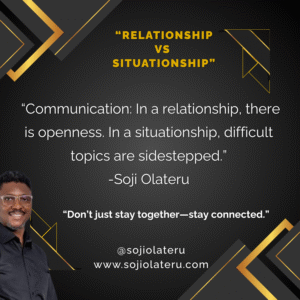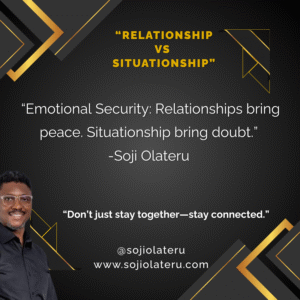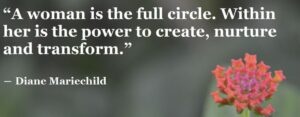This article begins our series on relationship vs situationship, exploring how to recognize the difference, avoid the traps of confusion, and embrace God’s plan for clarity and covenant love.
Many people assume they are in a committed relationship when, in truth, they are only caught in a situationship. At first, the difference may seem minor; however, over time, the contrast becomes clear. One brings peace, stability, and direction, while the other breeds uncertainty, emotional fatigue, and disappointment.
What Makes a Relationship vs Situationship Truly Different
A true relationship shows clarity and accountability. Both people know what they are building together. Intentions are openly communicated, actions match words, and the vision for the future stays consistent. In a healthy relationship, you don’t have to guess where you stand—you know.

On the other hand, a situationship thrives on ambiguity. It may look and feel like a relationship at times, but its foundation remains shaky. Conversations about the future are often avoided, and promises sound uncertain. Understanding the relationship vs situationship difference helps you avoid emotional confusion and spiritual distraction. Ultimately, clarity leads to peace and purpose.
– Communication: In a relationship, there is openness. In a situationship, difficult topics are sidestepped.
– Commitment: Relationships are defined by loyalty and consistency. Situationships rely on convenience and availability.
– Vision: A relationship looks forward—marriage, partnership, shared goals. A situationship is often stuck in “now,” with no plan for the future.
– Emotional Security: Relationships bring peace. Situationships bring doubt.
“Commitment creates clarity; vagueness breeds confusion.”
The Emotional and Spiritual Cost of a Relationship vs Situationship
The danger of a situationship lies in how it drains more than it gives. You may invest time, emotions, and prayers in someone unwilling to invest equally. Eventually, one person feels undervalued while the other avoids responsibility. As a result, the imbalance leads to frustration and spiritual weariness.
Spiritually, the cost runs even deeper. When you stay in a connection with no vision, you risk drifting away from God’s best for your life. Moreover, the longer you remain in confusion, the harder it becomes to see what God truly intends for you.
To read about before you say I do, click HERE
“Where there is no vision, people settle for convenience instead of covenant.”
From Ambiguity to Clarity
Moving from a situationship into clarity requires courage and honesty. You must ask hard questions: Do our values align? Do we want the same future? You should also set boundaries that protect your heart while honoring God through intentional choices. In fact, boundaries are not barriers—they are safeguards that preserve peace.
Above all, prayer becomes your greatest tool. Only God can reveal motives and guide you into relationships that reflect His covenant love. Therefore, trust Him to lead you beyond emotional confusion and into lasting clarity.
“Love without commitment is like a house without a foundation—it may stand for a season, but it will not endure.”
A Godly Way Forward
If you realize you are in a situationship, don’t stay bound by shame or fear. Sometimes the most courageous act of faith is to release what is unstable so you can embrace God’s plan. His will brings clarity, not confusion—covenant, not compromise.

To read what DJ Cuppy said on marriage, click HERE
For those already in committed relationships, continue nurturing what you have. For those caught in situationships, take heart: letting go of uncertainty today prepares you for godly love tomorrow. Indeed, every step toward clarity brings you closer to the peace and purpose God desires for your life.
In summary, the relationship vs situationship debate defines destiny, not titles. A relationship builds, while a situationship blurs. One stands on covenant; the other survives in confusion. If you’re unsure where you stand, stop asking, “What are we?” and start asking, “Where is God leading me?” Ultimately, clarity leads to peace and divine purpose.
“Clarity is a gift, confusion is a trap—choose the path that leads to peace and purpose.”
This is only the beginning. In Part 2 of this series, we’ll explore how emotions can feel like love but lack the commitment that true godly relationships require.
Now it’s your turn: Are you truly in a relationship, or are you stuck in a situationship? Don’t just read—pause, reflect, and take action. Does this connection honor God or only your emotions?
Share your journey in the comments below. Your honesty could be the light someone else needs to step out of confusion and into clarity. Remember, your story might be the spark that leads another heart toward covenant love.
If this article spoke to you, please share it with a friend or loved one who might be blessed by it. And while you’re here, take a moment to visit other articles on MY BLOG for more insights on faith, marriage, and relationships.
— Soji Olateru





Awesome 👌